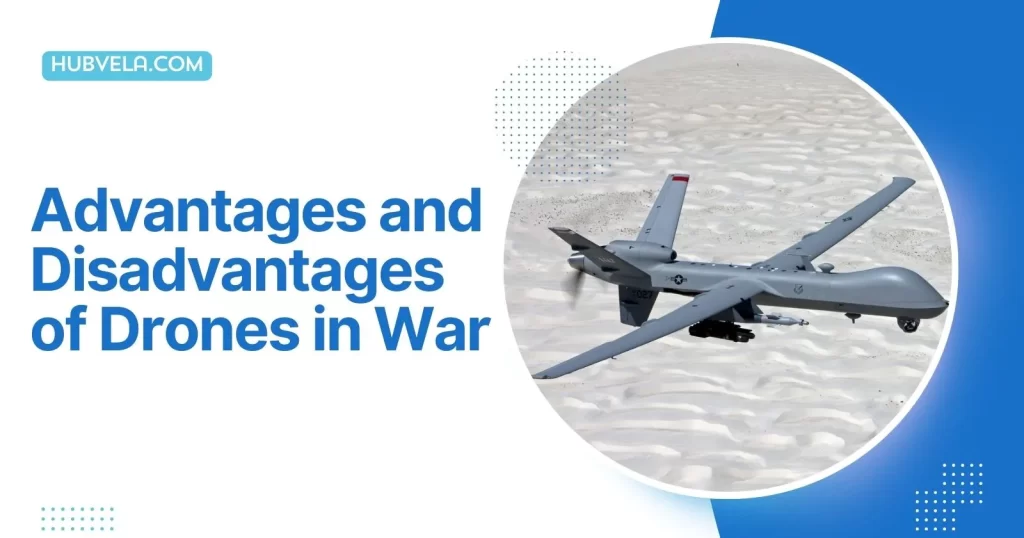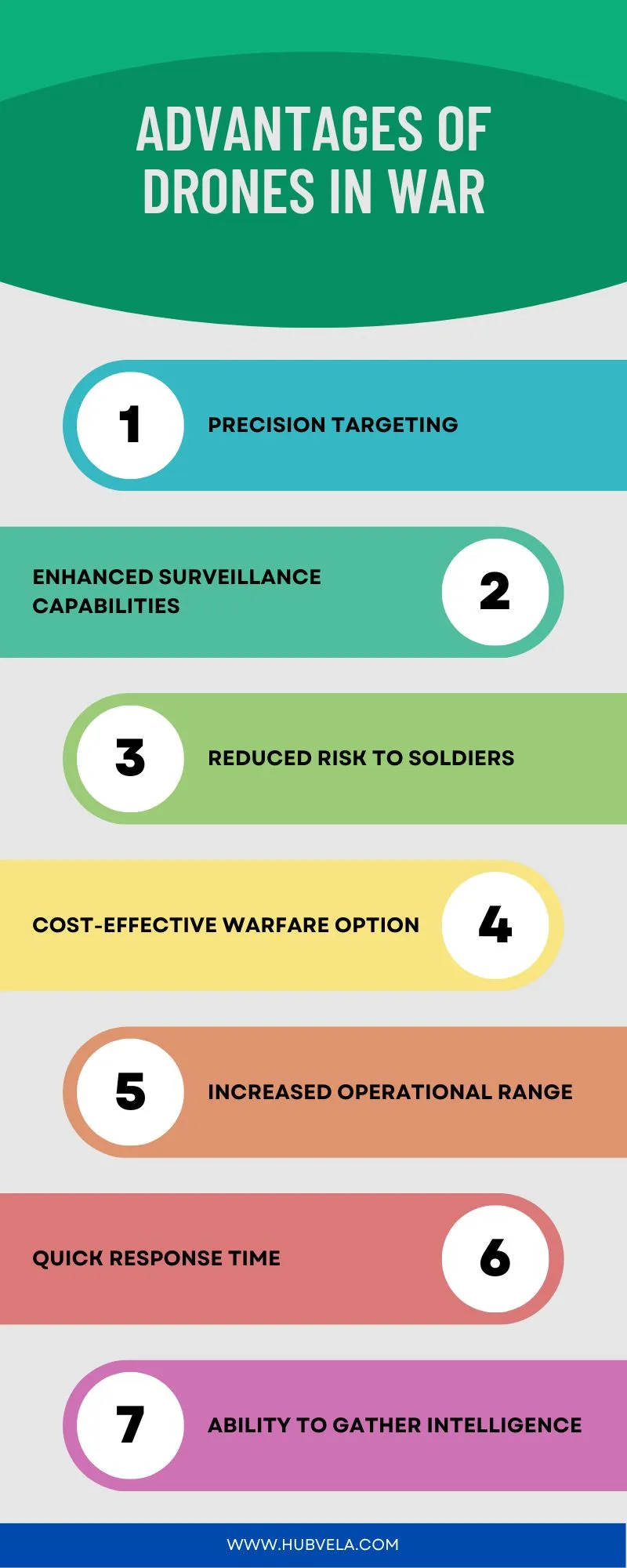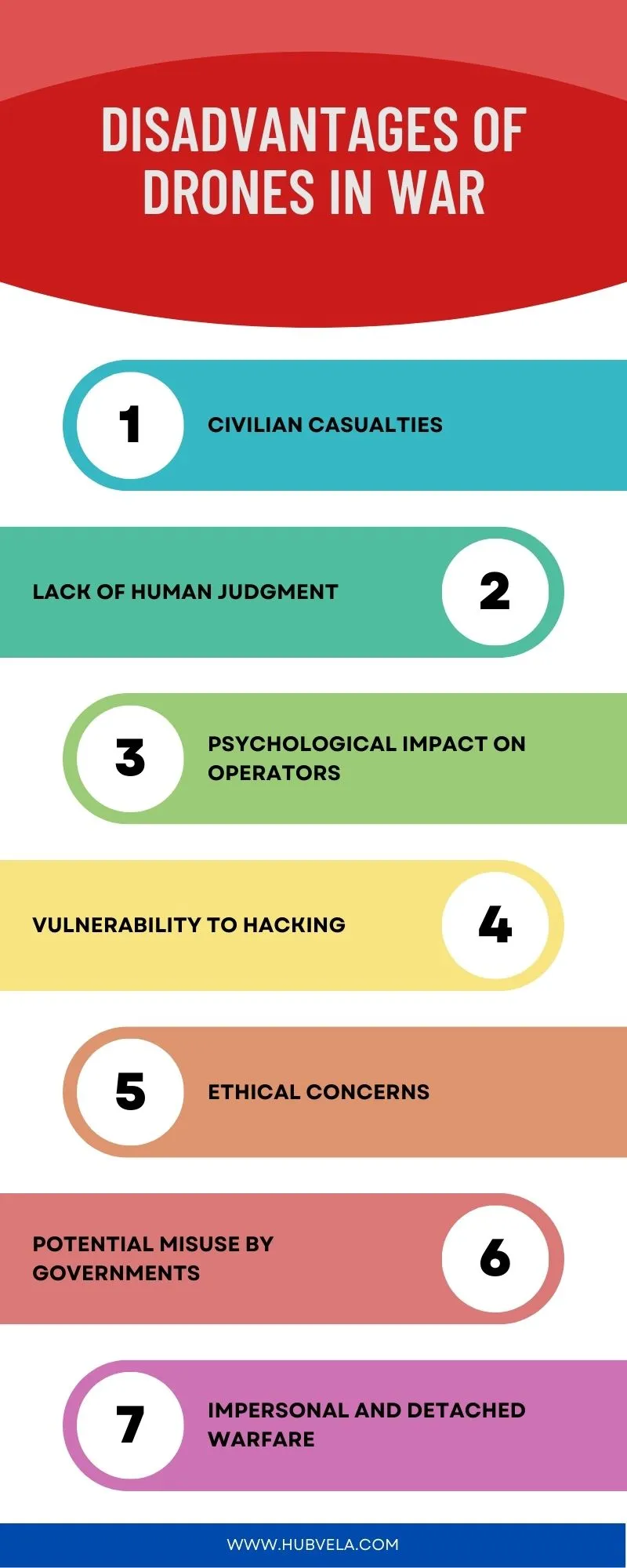Oh, you must be thrilled to know that drones are now a part of modern warfare. These unmanned aerial vehicles, with their ability to strike targets with precision and provide enhanced surveillance capabilities, seem like the perfect solution to keep soldiers out of harm’s way.
But let’s not get ahead of ourselves just yet. While drones offer several advantages in warfare, there are also some concerning drawbacks that we must explore.
So, let’s dive into the complex world of drones in war and uncover the advantages and disadvantages of drones in warfare.

--Advertisement--
Advantages of Drones in War
Drones have become an integral part of modern military operations, offering numerous advantages in various aspects of warfare. Some of the key benefits include:

1. Precision Targeting
Drones provide a significant advantage in war through their ability to engage in precision targeting. Unlike traditional airstrikes, which often result in collateral damage and civilian casualties, drone strikes can minimize these risks. With advanced surveillance technology and real-time intelligence, drones can accurately identify and target enemy combatants, reducing the likelihood of harming innocent civilians.
However, it’s essential to ensure that drone strikes comply with international law, as their use can raise legal and ethical concerns regarding the proportionality and necessity of force.
2. Enhanced Surveillance Capabilities
With their precision targeting capabilities, drones not only minimize collateral damage and civilian casualties but also provide enhanced surveillance capabilities in war. However, these capabilities raise concerns about privacy and the potential for abuse.
Drones can contribute to the formation of a surveillance state, where citizens’ every move is monitored. This invasion of privacy has ethical implications and calls for a careful balance between national security and individual rights. It’s crucial to address these concerns and establish regulations to prevent misuse of surveillance technology.
3. Reduced Risk to Soldiers
Soldiers can benefit from reduced risk in warfare through the use of drones. Drones offer improved reconnaissance capabilities, allowing soldiers to gather crucial information about enemy positions and movements without putting themselves in harm’s way. This strategic advantage not only reduces casualties among soldiers but also minimizes the need for troop deployment.
Additionally, drones can help in reducing collateral damage by precisely targeting enemy positions, thus protecting innocent civilians and infrastructure. Overall, drones play a vital role in safeguarding soldiers while maintaining operational effectiveness.
4. Cost-Effective Warfare Option
One of the key advantages of incorporating drones in warfare is their cost-effectiveness. Technological advancements have made drones more affordable and accessible, allowing military forces to save on operational costs.
Drones also offer strategic capabilities by providing real-time intelligence and surveillance, enabling commanders to make informed decisions. Their operational efficiency allows for quick deployment and flexibility in various combat scenarios.
Additionally, the use of drones minimizes the risk to soldiers, improving public perception of military actions.
5. Increased Operational Range
Drones in war offer a significant advantage with their increased operational range. They’ve the ability to stay in the air for extended periods of time, thanks to their increased endurance. This allows for improved situational awareness as they can cover larger areas and monitor enemy movements from a distance.
With remote operation, drones can be controlled from a safe location, reducing the risk to human operators. Additionally, their increased operational range reduces logistical requirements and improves target acquisition capabilities.
6. Quick Response Time
With their ability to cover larger areas and monitor enemy movements from a distance, drones in war offer another advantage: a quick response time.
Drones provide real-time monitoring, allowing for immediate situational awareness. This enables agile targeting, as the drone operators can swiftly identify and engage targets based on the evolving battlefield conditions.
Additionally, drones allow for rapid deployment, reducing the time required to gather intelligence and respond to threats.
7. Ability to Gather Intelligence
The ability of drones in war to gather intelligence is a crucial advantage that greatly enhances military operations. Drones provide a tactical advantage by collecting real-time information, allowing for strategic decision making.
With enhanced situational awareness, commanders can make informed choices on the battlefield. Drones play a vital role in target identification, helping to distinguish between combatants and civilians.
Disadvantages of Drones in War
The use of drones in warfare presents both advantages and disadvantages. While drones allow for precision strikes and reduce the risk to human life, they also have significant drawbacks, including:

1. Civilian Casualties
Drones in war have been responsible for significant civilian casualties, causing immense harm and suffering. Collateral damage, resulting from inaccurate target identification, has led to innocent lives being lost.
Despite efforts to implement accountability measures, such as stricter rules of engagement and increased training, mistakes still occur. This has negative legal implications and damages the public perception of drone warfare.
Addressing these issues is crucial to minimize civilian casualties and ensure the ethical use of drones in warfare.
2. Lack of Human Judgment
Due to their reliance on technology and lack of human judgment, drones in war are limited in their ability to make nuanced decisions on the battlefield.
The absence of human involvement in the decision-making process raises ethical implications and questions about moral responsibility.
With drones, there’s a lack of accountability for actions carried out, as the responsibility for these actions often falls on the operators and not the machines themselves.
This lack of human judgment undermines the critical thinking and empathy necessary in making ethical decisions during wartime.
3. Psychological Impact on Operators
The operators of drones in war face significant psychological challenges as they navigate the complexities of remote warfare. The impact on their mental health can be profound, as they grapple with the moral dilemma of taking lives from a distance.
The desensitization effect of operating drones, where killing becomes detached and impersonal, can lead to psychological trauma. Additionally, the ethical implications of remote warfare can weigh heavily on the operators, further exacerbating their psychological burden.
4. Vulnerability to Hacking
As you delve into the disadvantages of drones in war, one significant concern is their vulnerability to hacking. Cybersecurity risks are a major issue when it comes to drones, as potential drone vulnerabilities can be exploited by hackers. To combat this, countermeasures against hacking need to be implemented.
However, the legal implications of hacking drones also need to be considered. Moreover, the impact of drone hacking on military strategies can’t be ignored, as it can disrupt operations and compromise national security.
5. Ethical Concerns
One can’t overlook the ethical concerns surrounding the use of drones in warfare.
The moral implications of remotely controlled attacks raise questions about the value of human life and the potential for indiscriminate harm.
Legal ramifications also come into play, as it’s unclear how existing laws and treaties apply to this new form of warfare.
Additionally, privacy concerns arise when drones are used for surveillance purposes, potentially violating individuals’ rights.
Accountability issues and transparency challenges further complicate the ethical landscape surrounding drone warfare.
6. Potential Misuse by Governments
After considering the ethical concerns surrounding the use of drones in warfare, it’s important to acknowledge the potential for governments to misuse this technology, which presents significant disadvantages.
Government control over drones raises privacy concerns, as they can be used for surveillance and invasion of personal space. In the absence of strong international regulations, there’s a risk that governments may abuse their power and violate human rights.
This can lead to negative public perception and increase tensions between nations.
7. Impersonal and Detached Warfare
Drones in war contribute to impersonal and detached warfare, distancing soldiers from the consequences of their actions. The psychological effects of remote decision-making in distance warfare can be significant.
By operating drones from a safe location, soldiers may feel less connected to the reality of war. The impersonal consequences of their actions, such as civilian casualties, may not hit home as deeply.s
This detachment from reality can have long-lasting effects on the mental well-being of soldiers involved in drone warfare.
Conclusion on Advantages and Disadvantages of Drones in War
In conclusion, weighing the advantages and disadvantages, it’s evident that the use of drones in war presents both strategic benefits and ethical concerns.
The pros and cons of drones have a significant impact on warfare, with their ability to gather intelligence, conduct targeted strikes, and minimize the risk to human lives.
However, public opinion remains divided, and the future implications of drone warfare raise questions about the morality and ethics of remote warfare.


